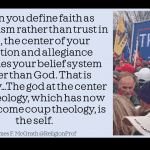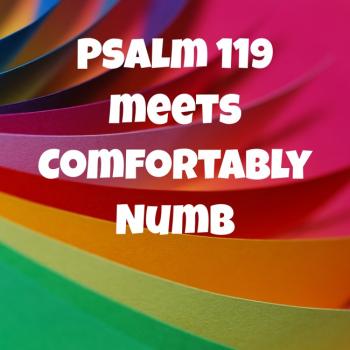I cannot hear these words, “You shall go out with joy,” without thinking of the joke about the man who was looking for guidance regarding his romantic life and opened the Bible at random expecting it to speak to him. The verse said “You shall go out with Joy” and so he called Joy and asked her out. Having someone named Joy in the class, as well as her husband, makes the joke all the more relevant, even though this isn’t their story (as far as I know).
The next example of scripture set to music that my Sunday school class requested that we talk about sets Isaiah 55:12 to music. It is the most famous setting of these words to music in our time, I am sure. It is by Rabbi Dr. Stuart Dauermann who is connected with Messianic Judaism. The song is set in what is recognizable as a Jewish style.
The words in Isaiah envisage a “second exodus” related to the return of exiles from Babylonia. Because the return was incomplete and the rebuilding of Jerusalem and the temple there disappointing, people continued to view the exile as ongoing, and to hope for the fulfilment of the expectation of a fuller second exodus. Those expectations inspired and influenced early Christianity. I suspect that little of that original context is in the mind of most who sing this song in churches today. I would love to know more about what the author of the song had in mind when setting the text to music.
I was also struck while thinking this past week about these words set to music and those of Psalm 150 which was our focus last Sunday, to find myself listening to the setting of an “Old Buddhist Prayer” (Vieille Prière bouddhique) to music by Lili Boulanger. Here is an English translation of the words:
Let everything that breathes— let all creatures everywhere,all the spirits and all those who are born,all the women, all the men,Aryans, and non-Aryans,all the Gods and all the peopleand those who are fallenin the East and in the West, of the North and the South,Let all those beings which exist —without enemies, without obstacles, overcoming their griefand attaining happiness, be able to move freely,each in the path destined for them.
I’m sure you will immediately notice the similarity of the opening words to Psalm 150. The differences are equally striking. I had already been thinking about the relationship between all living things being called to praise in the Psalm, and plants and even inanimate objects getting involved in Isaiah. My thoughts also turned to Jesus speaking of rocks crying out.
For those who’ve never studied South Asia, “Aryan and non-Aryan” in the Buddhist prayer reflects the perspective and self-understanding of the people of the Indian subcontinent in ancient times. Although the terminology was adopted by the Nazis and other white supremacists in the modern era, it doesn’t really have anything to do with that. Here, it simply means the writer’s own people (presumably) and any others. Rather than making God or even gods the focus of praise, the prayer is offered on their behalf as well, that all will be able to overcome obstacles and follow the path they are meant to. Such a different religious outlook, and yet with such striking similarities as well! Have a listen:
There is a wonderful detailed analysis of the music here:
I have not tracked down the origin of the text. Perhaps some scholar of Buddhism that I know can tell me easily? Boulanger also set Psalm 24 to music, which is an interesting choice given resonances between that and the Buddhist prayer she set.
One can sometimes find the Jewish Psalm and Buddhist prayer on the same program:
Boulanger also set a Hymn to the Sun, a modern poem by Casimir Delavigne.
Of related interest, there is a fascinating project to create functional 3D replicas of ancient musical instruments. Martin LaBar blogged about music in the Bible. A 19th century book by William Binnie on the Psalms has been digitized. Bob MacDonald continues blogging about the Psalms: Psalm 68; Psalm 69; Psalms 75-76; and Psalm 145:8-14 with recording!
Finally, see also Del Case’s blog post about his instrumental setting of Psalm 150:













